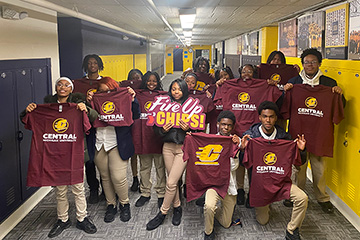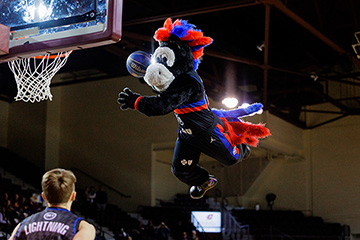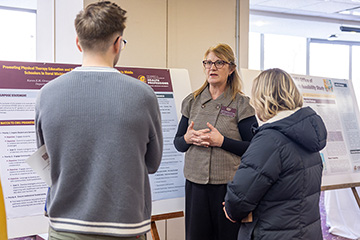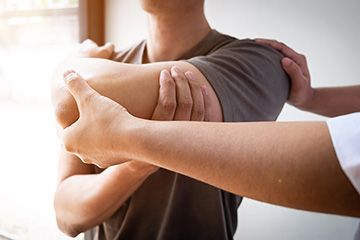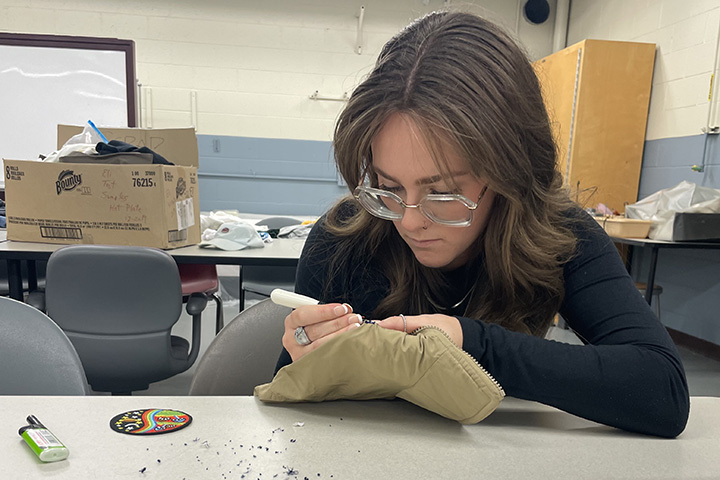Peer counseling group turns 25
SAPA made CMU a national leader in sexual aggression support
More than two decades ago, one of the key concepts that made Central Michigan University a leader in addressing sexual aggression was inspired by a scene in a wildlife documentary.
Steve Thompson, who started Sexual Aggression Peer Advocates, watched a lion chase down and eat a zebra while the other members of the herd stood by. He realized that a new sexual aggression program he was establishing at CMU needed to focus on the passive behavior of bystanders.
“Don’t be a zebra, don’t be a bystander,” he said last month reflecting on the No Zebras, No Excuses training at the heart of the Sexual Aggression Peer Advocates program, established 25 years ago this month.
Students helping survivors
Thompson started the program, one of the first in the nation, in 1998 when he realized that survivors of sexual aggression never got to talk to people their own age.
He wondered, “Why can’t peers talk to peers?”
Since then, SAPA’s beating heart has always been its student volunteers.
“They’re the magic of our program,” said Megan Varner, director of Sexual Aggression Services. Varner started as a peer advocate with the program in 2007, was its graduate assistant from 2011-15, and served as assistant director from 2015-22 before she was hired as director last year.
Becoming a peer advocate requires 52 hours of initial training with annual refreshers, Varner said. While some of it takes place online, three-quarters of it are held in person over two weekends.
The advocates take calls from survivors who want to talk to someone. They also can meet survivors at health care facilities and law enforcement agencies.
When peer advocates found out that another university had a safe room for sexual aggression survivors, they worked to get a similar space on CMU’s campus.
SAPAs also produce and act in skits – modeled on the “No Zebras” concept – that are part of incoming student orientation. They take ownership of the material and keep it relevant to successive classes of students, frequently meeting during the summer to prepare for fall orientation.
They also take ownership of the SAPA program itself, offering suggestions about how to make it stronger.
One of their recommendations was allowing men to join and ultimately answer calls. Thompson said he was initially not in favor. The students in the organization persisted and won him over in 2004.
“I was completely wrong,” Thompson said. “Completely wrong.”
Thompson was always open-minded in leading the group, said Suzy Stefanski, who was a peer advocate while attending undergraduate from 1999-2002. Stefanski later was SAPA’s graduate assistant from 2003-05 and the dedicated SAPA counselor at CMU’s counseling center from 2005-09.
Peer advocates also pushed for the organization to increase the amount of time the service was available to survivors. Originally, peer advocacy services were only available 40 hours a week. Following input from the peer advocates, it became available 24/7.
Help is a phone call away
SAPA started as just a phone number that connected survivors with a peer advocate on donated cellphones. They’d figure out what services a survivor calling needed and help make that connection.
“More times than anything, the caller just wants to talk,” said Thompson, who retired in 2012 after running the program for 15 years.
The availability of mobile phones was one of the things that made joining the program at the time attractive to Stefanski. She could help people from anywhere, rather than sitting next to a phone connected to a landline, she said.
The ways people communicate have changed dramatically since SAPA was founded, and students led the movement to adopt new, emerging technologies. Over the years, that has included pagers and an anonymous chat feature. At one point, the Rape, Abuse and Incest Network even reached out to SAPA to consult about the possibility of setting up their own chat feature, Stefanski said.
SAPA ultimately moved away from the live chat feature when leaders felt it couldn’t adequately protect the confidentiality of users, Varner said. Today, survivors can contact the organization via phone, text or person-to-person contact.
From sexual assault to sexual aggression
In addition to broadening how survivors could reach out for help, the group also adopted a broader definition of what it means to be a survivor. The term sexual assault wasn’t big enough, they felt, so they changed the organization’s name.
Sexual assault is a core piece of that, but peer advocates also now receive training on how to handle stalking, intimate partner violence and harassment. While different in fundamental ways, they all have something in common.
“They’re all about power and control,” Thompson said.
The group has also started to incorporate human trafficking into topics they might need to address with callers.
Focusing on diversity in survivors
While the forms of sexual aggression have something in common at their core, not every survivor’s experience is the same. It’s especially true depending on a survivor’s identity, Varner said.
For example, Indigenous women are much more likely to be survivors of domestic violence, Varner said: One in two will experience it in their lives compared to one in three non-Indigenous women. A member of the LGBTQ+ community also might face additional barriers to leaving an abusive relationship if they have not come out and their partner threatens to expose them if they try to leave, she said.
COVID-19 brings necessary innovations
While most of the organization’s changes come from within, the COVID-19 pandemic imposed change from outside. Because the organization operates only when school is in session, SAPA’s operations shut down from March to May of 2020. The shutdown of services led to the loss of visibility across campus, making it harder to reach out to students new to campus.
Varner said this academic year feels like the organization has finally returned. They’re reaching out and making contacts with academic departments, and contacts from survivors this year reflect pre-pandemic numbers.
The realities of the pandemic forced the organization to take stock of how it interacts with students. Students today are much more mindful of how they invest their time and emotional energy, Varner said. SAPA became more mindful of how it reaches out to them because things that worked 10 years ago don’t reach students in the same way.
